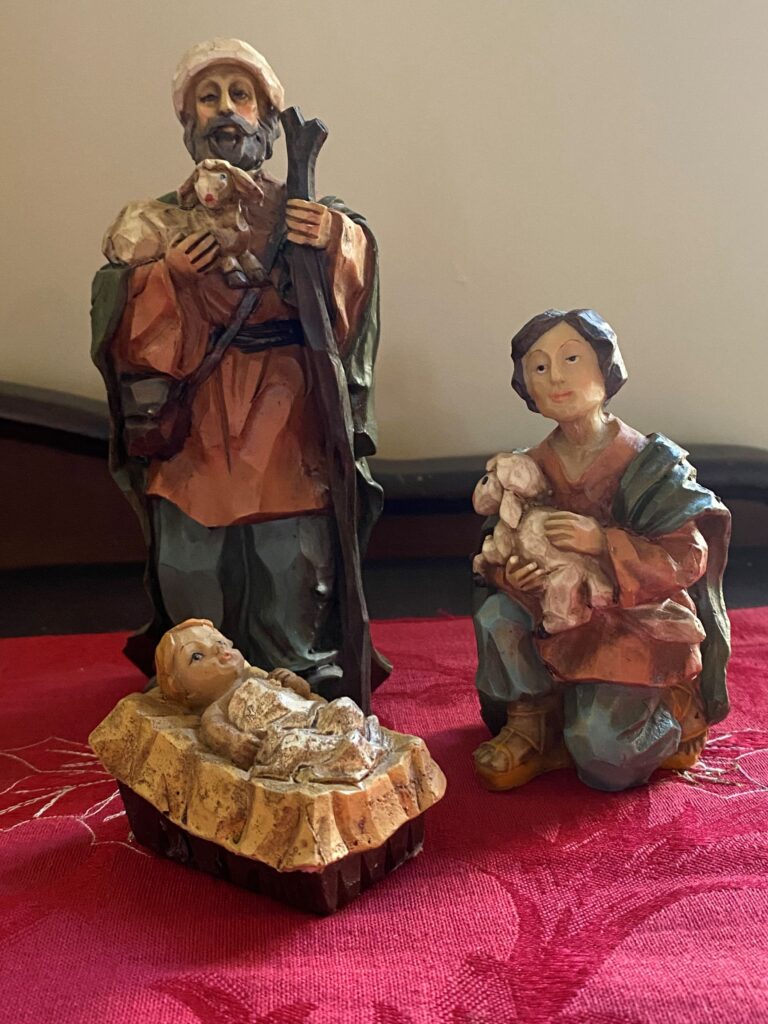Last night, just as dusk was setting in, we went out in search of a star. Not any ordinary star, but the Christmas star of 2020. We drove to the university’s agricultural farmland, out of view from tall North Carolina trees, to get a broad view of the horizon. As it turned out, many others lined the road, perched behind their tripods with zoom lenses and telescopes, also in search of the star in the west.
We drove to a quiet spot past the agro-ecology farm to watch the horizon transition from amber to grey, and stars begin to pop and twinkle in the night sky. And then we saw it clear as day, the double lights of the sought star. For though it looked like a star, it was actually the closest orbital alignment in almost four hundred years of the solar system’s two largest planets, Jupiter and Saturn. Astronomers are calling it “The Great Conjunction.” Though the planets remain four hundred million miles apart, they appear from earth to have a distance of one-tenth of a degree between them.

While staring up at the heavens just a few days before Christmas, I couldn’t help but think about the wisemen and shepherds in the story of Jesus’s birth. The wisemen were astronomers who studied both the heavenly constellations as well as Jewish history and prophecy. They were familiar with the messianic prophecies: “A star will come out of Jacob; a scepter will rise out of Israel” (Numbers 24:17), and “But you, Bethlehem….though you are small….out of you will come for me one who will be ruler over Israel…” (Micah 5:2) The wise men followed the star in the east to Bethlehem with a desire to worship the prophesied king of the Jews. Little did they realize he was the King of Kings born in a lowly stable.
The shepherds were also very familiar with the night sky. They spent their days and nights in the fields watching over their flocks, herding them to good pasture while protecting them from predators. Shepherding was a lowly occupation, a job that made them ceremonially unclean and seen as untrustworthy. They, like the wisemen, were very familiar with the open night sky and its canopy of blinking stars and constellations.
Imagine the shepherds circled around a fire for warmth, staring up at the sky while keeping watch over their resting sheep. All was calm, all was bright. Suddenly, an angel appeared to them, shining with the glory of God. To say they were terrified is an understatement! The angel immediately spoke assurance to them, telling them not to be afraid but to listen to his announcement of “good news of great joy that will be for all the people.” Wait! What? An angel from God was sent with a message for all people, and was bringing it to shepherds, the social outcasts of society?!!
The angel went on to boldly announce that prophecy was being fulfilled that very night with the birth of the long-awaited Savior, declaring, “He is Christ the Lord” (Luke 2:10). What earth shattering news! The long wait was over! The Messiah had finally come! The angel gave them a sign to confirm his message. They would find a baby wrapped in long strips of cloths and lying in a manger” (:11). A manger? How strange! Why would the promised Christ child be born in a dirty manger, an animal feeding trough? That sounded all too ceremonially unclean.
Then all the heavens exploded with brilliant light and sound! For just as suddenly as the angel appeared to them, he was joined by a throng of angels robustly voicing praise to God: “Glory to God in the highest, and on earth peace to men on whom his favor rests” (:13). No doubt, the shepherds were awestruck by the spectacular eruption of angelic light and God glorifying praise. In amazement they stared and listened, their heightened senses working to absorb the spectacle before them.
The shepherds then watched in wonder as the angels left them and went into heaven. They collected themselves, and excitedly said, “Let’s go and see!” and rushed to Bethlehem to look for the promised sign they had been given. They came to the stable and found the new family with their baby wrapped in cloths and lying in a manger (:16), just as they had been told.

With great joy they relayed to Joseph and Mary their amazing account of the multitude of angels who announced the coming of the Messiah. But their job was not done! The angel had told them the coming of the Messiah was “good news of great joy for all people.” So, when they had seen the sign of Jesus in the manger, “they spread the word concerning what had been told them about this child. And all who heard it were amazed at them” (:17-18).
Including Mary! For her child, Emmanuel come, was already changing lives just hours after his birth. The gospel transformation had begun. And “she treasured up all these things and pondered them in her heart” (:28). True prophetic fulfillment!
It was God’s intention that the gospel come first to shepherds. They took it deeply to heart and immediately embraced the call to spread the good news of redemption to all who would hear. And people responded with wonder and joy.
The lowly shepherds of sheep were becoming shepherds of men. For that is the intended effect of the good news of redemption for the world.
The shepherds’ lives were changed by the angelic account. When they returned to their sheep and their life of quiet pasturing, they were “glorifying and praising God for all the things they had heard and seen, which were just as they had been told” (:20). I doubt their lives were ever the same. Every time they looked up at the night sky, they would recall the glory of God resounding through the skies with the vibrancy of heavenly angelic light and praise. Spiritual experiences like this change our perspective. We never look at life the same way; we come to see God with a much bigger lens.
How well are our hearts aligned to see and hear the good news of great joy this Christmas? How is God speaking to us about the birth of Christ being “for all people?” Are we able to ‘spread the word concerning….this child,’ the infant king, who broke into history as prophesy fulfilled with the promise of redemption life? The world remains desperate for a Savior. It longs for persons to willingly share the wonder of the Messiah come, and become “shepherds of men.”